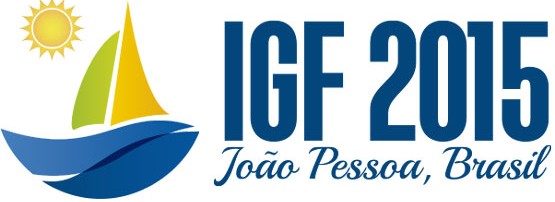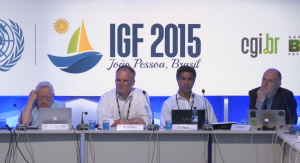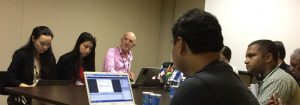
Last week, APNIC participated at the Tenth Annual Internet Governance Forum (IGF 2015) held in João Pessoa, Brazil, from 10 to 13 November 2015. More than 2,400 people from around 120 countries participated in the meeting, with thousands more joining online.
The main theme for IGF 2015 was “Evolution of Internet Governance: Empowering Sustainable Development”. Over 150 workshops and other sessions were held during the four-day meeting addressing opportunities and challenges under the sub-themes of Cybersecurity and Trust; Internet Economy; Inclusiveness and Diversity; Openness; Enhancing Multistakeholder Cooperation; Internet and Human Rights; Critical Internet Resources; and Emerging Issues.
APNIC staff joined a number of IGF sessions as panellists, and attended many other sessions. They also met with members of the APNIC community and colleagues from other Internet organizations.
This year, APNIC also provided partial travel support for eight fellows from the Asia Pacific region to participate at IGF 2015.
APNIC activities included:
- Paul Wilson participated in many panel discussions and other events including:
- Setting the Scene, a introductory session for this IGF event, where he spoke about the history of “Critical Internet Resources” discussions in the IGF, and the success of the IGF in promoting awareness and dispelling myths about CIRs and IPv6.
- IGF beyond 2015: Extend mandate, strengthen institution, where the panel discussed the need for extending the IGF mandate for five years or more; measures for strengthening and further improving the IGF in future; and strategies for supporting the renewal of the IGF in the coming WSIS review process.
- Dynamic Coalition on Accountability of Internet Governance Venues, at which Paul explained the accountability mechanisms of APNIC and the RIRs and their relation to the Address Supporting Organization; and the ICANN accountability review.
- The sixth meeting of the IGF Dynamic Coalition of Core Internet Values discussing the theme “Core Internet Values as a Reference Standard for Global Internet Policy”. Paul spoke of the technical features of the Internet and their relationship with the core values discussed.
- An invitation-only “Deliberative Polling ” session, conducted by Stanford University, on regulatory options for improving network access.
- Pablo Hinojosa facilitated the Open Forum – Internet Number Community, which discussed how the number community has developed policies for the management and distribution of IP resources; how it has led the deployment of technologies that use such resources; and the efforts of the Internet number community in producing a proposal for the transition of the stewardship of the IANA numbering function.
- Pablo attended the Best Practice Forum on Creating an Enabling Environment for IPv6 which discussed a document (to be finalized in December) that aims to contribute to promoting the continued deployment of IPv6 globally.
- Pablo also participated in the Consultations on the WSIS+10 review, where he spoke in support of keeping the WSIS process open for meaningful participation of different stakeholders.
- Sylvia Cadena spoke on the panel of the Equity and the developing world in Internet Governance session. She also helped organize Addressing funding challenges for continuous innovation where Paul spoke about the ISIF Asia model for funding innovative projects and research activities for Internet development.
- APNIC staff participated in the Seed Alliance Awards ceremony, featuring FIRE, FRIDA and ISIF Asia award-winning projects. Paul presented awards to winning recipients of ISIF Asia grants, and made closing remarks to end the session.
- Paul and Akinori Maemura participated in a meeting of the NRO Executive Council and also a meeting between the Internet technical organizations (“I*”) group.
- Paul chaired a meeting of the APrIGF Multistakeholder Steering Group, which discussed the preparations for the 2016 APrIGF, to be held in Taipei; and also a new initiative for an Asia Pacific School of Internet Governance, which is proposed to be held during the Taipei meeting.
- Paul also spoke at the 25th Birthday event for the Association for Progressive Communications where he was recognized for his work as an early Council and Board member of the Association.
The views expressed by the authors of this blog are their own and do not necessarily reflect the views of APNIC. Please note a Code of Conduct applies to this blog.


